Pádraig Ó Méalóid asked the question What's your opinion of the term 'Graphic Novel'? to several notables of the comic book arts. All the usual bases are touched; Neil Gaiman has fun at Campbell's expense (I'll get ya! Watch yer back!), Todd Klein evokes the serial nature of the original publication of the novels of Dickens; Bryan Talbot allows that 'graphic' has connotations of explicit sex and violence. This last should be dismissed quickly; the primary meaning of the word has always been art of and for printing, and it is derived from the ancient Greek word for drawing, 'graphikos'. The other meaning probably came along after the word was used as the title for an early illustrated newspaper, the Graphic, which sought to be more vivid and striking than its 'staid rival,' the London Illustrated News.

It never matters if anything sensible is said in these things, because nobody is paying attention. Case in point: respondent Gary Spencer Millidge adds: "The comics' industry's usage of the description 'trade paperback' I also find particularly unhelpful. Do the comic reading public have any idea what that means?." And sure enough, the first commenter writes: "For me, 'Graphic Novel' is separate from collections of ongoing monthly comics for which I use the distinction 'Trade Paper Backs.'" Nobody is listening (a little Knowledge is a good thnig).
Most of the other respondents have given up on treating it as anything more than a euphonymous marketing tool, more or less useful, more or less tolerable, while Rick Veitch and Dave McKean refer to a time when it represented something more, a reaching for a form that could carry work of higher ambition.
The question should have been, not 'What do you think of the term...?" but "What do you think of the idea of the graphic novel?'
***********
(I wrote a two thousand five hundred word extension to the above, then amputated it and threw it away.) (you will be glad to know)

It never matters if anything sensible is said in these things, because nobody is paying attention. Case in point: respondent Gary Spencer Millidge adds: "The comics' industry's usage of the description 'trade paperback' I also find particularly unhelpful. Do the comic reading public have any idea what that means?." And sure enough, the first commenter writes: "For me, 'Graphic Novel' is separate from collections of ongoing monthly comics for which I use the distinction 'Trade Paper Backs.'" Nobody is listening (a little Knowledge is a good thnig).
Most of the other respondents have given up on treating it as anything more than a euphonymous marketing tool, more or less useful, more or less tolerable, while Rick Veitch and Dave McKean refer to a time when it represented something more, a reaching for a form that could carry work of higher ambition.
The question should have been, not 'What do you think of the term...?" but "What do you think of the idea of the graphic novel?'
***********
(I wrote a two thousand five hundred word extension to the above, then amputated it and threw it away.) (you will be glad to know)
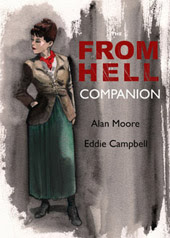
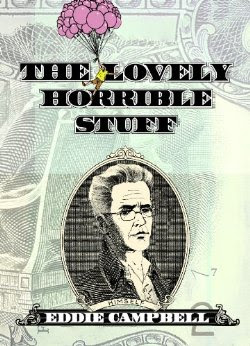

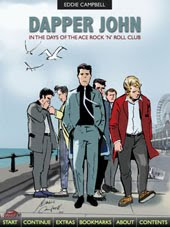
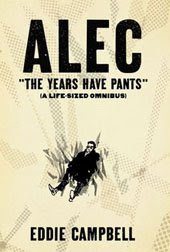
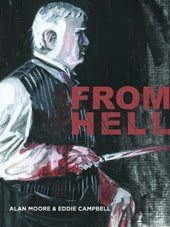
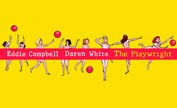
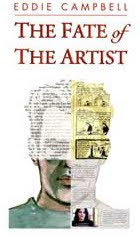
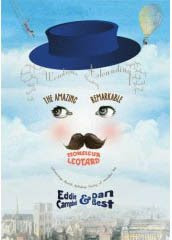

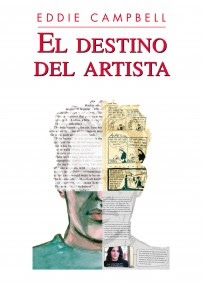
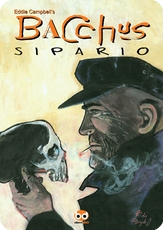
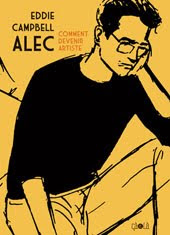

13 Comments:
It's been a long time since I have really cared about the term "graphic novel" (even though 99% of the comics I read are in book form and many, if not most, are graphic novels--like "George Sprott" and "Asterios Polyp", two recent favorites). But the weird mis-use of the term "trade paperback" still makes the hairs on my back stand up. (You don't want to see this when it happens, by the way.)
Once upon a time, in the 50s I think, some publishers started packaging novels in a small cheap paperback format. This really democratized the novel, and lots of great books became really widely available for really low prices. Lots of romance novels and he-man action books as well. And they often had super-cheesy racy covers that made the book look a lot naughtier than it actually was. (In my own library, I am especially fond of an edition of Kiss Hollywood Good-by by Anita Loos, which features a back view of a standing blond flapper, nude except for her high-heels, stockings, hat, and cigarette holder.)
These cheap paperbacks were sold in drugstores and on newsstands, well beyond the traditional book trade.
In the 60s or 70s, publishers came up with the notion of publishing better-quality paperbacks. They had larger trim sizes, were printed on better paper, and cost more than the smaller drugstore paperbacks. Their price point was more than the cheaper paperback but less than a hardcover. Publishers were dividing up the market by price, just as GM did when it used to price its cars by brand (Chevy the cheapest, then Pontiac, Buick, Oldsmobile, and Cadillac at the high end.) The contents of the larger, more expensive paperbacks were initially more high-brow than the romances and he-man adventures of the smaller cheaper paperbacks.
To distinguish the two kinds of paperbacks, someone in the book industry (I don't know who) started calling the small cheaper ones "mass market paperbacks" because they were sold into the mass market of drugstores and supermarkets and treated as disposable products like magazines. The larger, more expensive paperbacks were called "trade paperbacks" because they were sold into the book trade and treated with the same dignity as hardcover books (they didn't have their covers ripped off when they were returned, for example).
Obviously, over time these distinctions have ceased to have a commercial meaning. Mass market paperbacks get sold in bookstores, and trade paperbacks can be found in Target and Walmart. Now the terms only refer to the physical formats, not the markets. But at least there is a historical logic to the terms.
There is a historical logic to the term graphic novel, even if we don't like it. But for the life of me, I just can't imagine how the distinction between trade paperbacks and graphic novels took hold in the minds of comics readers. I can't see any commercial logic to it. Whence did this idiotic distinction arise? Who, at any time in the history of the comics business, would have found these distinctions useful? (And I say "comics business" as opposed to "the art of comics" because the only reason for this distinction to exist is commercial, even if I can't see what that reason is.)
Thanks, Robert, all of it true.
One detail I might add. It was once explained to me, and the story sounds convincing, that the origin of the specific size of the 'trade' paperback came from wrapping a softcover around the uncovered innards of the hardcover (which always came first) to show the 'trade' ie the bookstores what the paperback was going to look like when it came out. that is, it was a false version that only existed in the trade for promotional purposes. Somewhere along the way somebody had the bright idea of actually marketing the paperback at that size, which held onto the prefix 'trade' to differentiate it from the regular size. The name is now applied to any paperback that is larger than the conventional old-style paperback.
The problem with the misuse of the term in the comics business is that it comes at a time (last ten years) when the comics field has been desperately trying to interface with the bookstore field. The ignorance on display really doesn't help us at all.
p.s. I saw a self appointed comics spokesperson once talk about a 'trade' in the comic-book sense while addressing a room-full of librarians. I remember thinking that surely not a person in the room understood what was being referred to.
Thanks for pointing to The Graphic; I'd never heard of it, but it sounds fascinating.
I want to see the 2,500K dvd extras to this post, and I bet I'm not the only one. Until you actually click 'empty' on your trash folder, those words are probably sitting there still. Nice auto-post filler for when you're away on vacation...
Pam in LA
I'm a librarian, and I've been aware of the "mass market paperback" vs. "trade paperback" distinction for years, long before comics got a hold of it. I doubt that room full of librarians suffered much confusion.
Quite so.
but in comics, the meaning of the term 'trade-paperback has become hopelessly screwed. If you follow one of the links above you will come to this quote, and I'd be interested to hear your comment on it, being a librarian, though I think you have already proven my point:
One of the most common mistakes made in our medium is the confusion of Comic Books with Graphic Novels. This is sort of like referring to a Magazine as a Newspaper; while they may contain similar information, they are entirely different formats.
The main source of misinformation in this case is the film industry and celebrities. Part of it is simple ignorance, while much of it is the desire to disassociate multi-million dollar film projects with the stigma of comics on which they are based. For instance, Zach Snyder's recent film adaptation of Watchmen contained a tag line in the trailers referring to it as "the most celebrated graphic novel of all time." Yet Watchmen is not a graphic novel. It was 12-issue mini series published from 1986 to 1987. Later Watchmen was collected into a format known as a Trade Paperback.
Trade paperbacks or 'trades' can easily be confused as graphic novels because they both present a seemingly self-contained story in a similar format. The difference being that a trade is the collected version of a story previously published in an ongoing, maxi- or mini-series comic. Whereas graphic novels present an original story.
At the end of the day, they are all comics in some format. Still, a little knowledge is always a good thing.
Now, would you agree with me that a roomfull of librarians would be utterly confused?
(as I am myself, except that I have met the problem before)
This skewing, or screwing of terms has been going on for ever though.
Cartridge paper used to be the thick paper one used to wrap bullet and gunpowder in to make a cartridge. Now we talk about A4 cartridge, which doesn't necessarily even mean thick paper any more, and I have heard it in relation to copier paper. This is not shocking or disturbing though, we just shrug and get on with our lives, and order the next batch of cartridge paper without even thinking of making cartridge tubes(for the storing of bullets and powder) out of it
The same with magazine, which used to mean something like military storehouse. Which is why I think the first magazine used the word magazine in the title, because it was a storehouse (don't know if it was militaristic in any way) of different articles, as opposed to a book, which is just one article.
What this has to do with the term graphic novel, or the idea of the graphic novel, I don't know.
But I am going to start an underground movement and call my adult big comics "Graffik Noffels". They will be sold under the counter at Borders, and they won't be self monitered by the graphic novel police and their silly graphic novel code authority. I might even dare to publish them as periodicals, and they might not even be sequential art! I might even attempt a "Graffik Autobiograffy"!
Re: this comment:
"I saw a self appointed comics spokesperson once talk about a 'trade' in the comic-book sense while addressing a room-full of librarians. I remember thinking that surely not a person in the room understood what was being referred to." It's true that no one could know whether we're looking at a self-contained story (what would be called a "graphic novel" if the term meant anything)or a collection of issues in a series, because of the rampant confusion that's already been pointed out. But as a librarian thinking about purchasing books for the collection, that distinction may not be important anyway. Those trade paperback comics are going to be shelved together (and being a trade gives you an idea of the rough price point). If you're getting good circulation, you'll buy more. Presumably your library users know the difference.
You will always be my favourite Graphic Novelist Mr Campbell.
The term "graphic novel" has its uses: it gives people unfamiliar with comics a way to talk about them, in terms of comparing them to a prose novel & possibly being less embaressed by admitting to reading them. From a librarian's persepective(I am one) the term graphic novel, while meaning both Maus & Ultimate Spider-man collections, makes it easier to get the books through cataloguing into the system. As the general public becomes more familiar with comics, or graphic novels, terms identifying the differences between an OGN & a tpb will probably occur.
Summary:
Gary says it's unhelpful, Robert says it makes the hairs on his back stand up, I say it's stupid, librarians take it all in their stride.
it occurred to me that my argument was baseless since there is no reason for a librarian to be discomfited since, stupid or not, none of the above affects either where the stuff is filed or who is directed to the shelves.
But we've reached the stage where it goes round in circles, so I'm closing the comments.
Subscribe to Post Comments [Atom]
<< Home